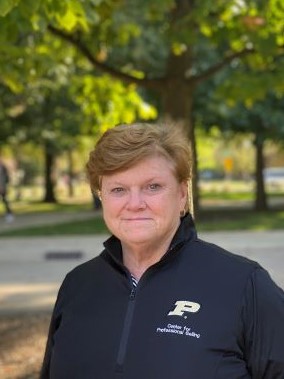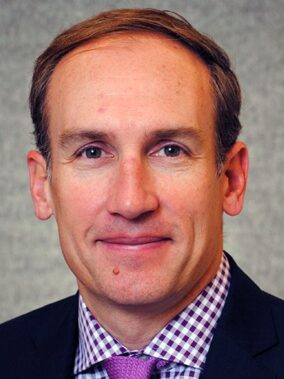HHS Online Faculty Fellows Program seeks ‘culture change’ toward online education
Written by: Tim Brouk, tbrouk@purdue.edu
With COVID-19 encouraging people to either stay home or avoid large groups of people, demand for online education has skyrocketed. Online enrollment for Purdue University degrees and certificate programs nearly doubled between fall 2019 and fall 2021, from 2,455 students to 4,141 students. HHS online programs saw a similar increase — from 121 students to 202 students — over the same period.

Anita Dale
Anita Dale, continuing lecturer and managing director of the Center for Professional Selling, is one of the first Purdue College of Health and Human Sciences (HHS) Online Faculty Fellows. The HHS Online Faculty Fellows Program launched in the fall of 2021 and explores opportunities for new professional, continuing and graduate education online offerings while providing support for the development of new online offerings. This initiative was inspired by the “Create More Online Offerings” strategic theme in HHS’ 10-year Strategic Roadmap.
Dale and the other fellows use the $5,000 awarded to them to develop online coursework, conference travel and research support. She was an early applicant to the fellows program because of her positive encounter earning her master’s degree online in family financial planning from Iowa State University in 2009.
“I came through that experience recognizing the value of instruction that was available any time, all the time,” Dale said. “I was a working professional when I got that degree. Online education allows us to meet people where they are with offerings that can make them either become better at what they currently do or learn something they want to do. I completely respect undergrad face-to-face education, and I know not everybody can participate that way. Online education is a way to make education accessible for anybody who wants it.”
In recent years, HHS launched an aggressive push to create degrees and certificates to the already robust coursework offered through Purdue Online. There are currently seven Purdue HHS online degrees and certificates, which include master’s degrees in public health and health administration.
Dale’s online certificate in professional selling program includes two courses — professional selling and advanced sales. Both are geared toward students unfamiliar with the sales process or those seeking career development in their sales careers.
“Sales can be the pathway to a million different careers,” Dale said. “Sales process is not just the generation of revenue; it’s selling your ideas, getting that promotion. It’s fundamental in succeeding in life.”
More than just taped lectures
When developing her online certificate courses, Dale polled her selling and sales students, many who were thrust into online learning two years ago at the beginning of the pandemic. She found students want more of an interactive video game experience rather than taped lecture after taped lecture.
“Online education needs to be something other than a 50-minute recorded lecture for it to be an optimal success,” Dale said. “Online education needs to grab and engage the student just like I can do with face-to-face instruction in my classroom.”
Virtual reality (VR) could be an ultimate online education experience. However, Dale warned that instructors using VR can’t coast on that technology either. Dale’s example is that instead of a tour of the Sistine Chapel, students want to be 21st century Michelangelos and paint on the Sistine Chapel ceiling. For her sales classes, this could mean experiencing an interactive simulation of a sales call instead of just watching video of one.
Jason Harris, associate professor of health sciences and HHS associate dean for graduate programs and online education, concurs. He initiated the HHS Online Faculty Fellows Program.

Jason Harris
“What we’re really trying to do is to create a culture of what we call online learning, to really get the faculty excited about doing that,” Harris explained. “Some naturally are, and some feel they have to do it.
“We’re trying to build that culture, make people really accepting that online is but another way to provide opportunities for our students, whether they are first-time college students or lifetime learners looking to explore a new path in life.”
Who’s in so far
Joining Dale and Harris in the HHS Online Faculty Fellows Program are Cody Mullen and Andrea DeMaria (Department of Public Health), Joshua Alexander and Michelle Gutmann (Department of Speech, Language, and Hearing Sciences), and Sandra Sydnor (White Lodging-J.W. Marriott, Jr. School of Hospitality and Tourism Management).
Gosney said the pandemic has not only increased online student enrollment but also the demographics of those enrolled.
“The number of undergrads taking online classes in HHS has rapidly increased,” he added. “It’s not just professional and continuing graduate education, it’s a number of undergrads taking online courses.”
As the HHS Online Faculty Fellows increase quality and quantity of online offerings, one thing is for sure: Online education will not go away when the pandemic ends.
“Too often, we have interpreted online education as a weak sister to face-to-face education,” Dale said. “We need different tools. We need additional tools. We need to think creatively about our areas of interest and influence. How do we build things? From my perspective, we have a ways to go.”